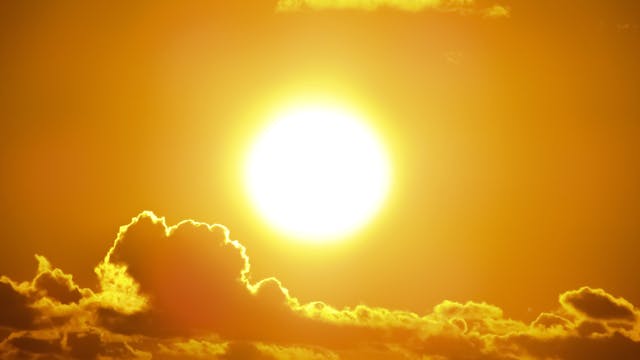
What noise would the sun make? The sun doesn’t make a sound in the conventional sense because there is no air for the sound waves to travel through.
Sound is a pressure wave that moves through a medium. The energy is passed from molecule to molecule until it runs out and the sound fades away. Sound travels at different speeds through different mediums and generally, the denser the material, the faster the speed of sound. If a material is dense, the molecules are close together and it is easier for the energy to get passed from molecule to molecule. I say generally because often dense materials have heavier molecules and it is harder for them to pass the sound energy on than lighter molecules. That is why gold is denser than aluminium but the speed of sound in aluminium is twice as fast as that of gold, 6320 m/s. On the other side, the less dense a medium is, the slower the speed of sound. Air is less dense than water, so the speed of sound in air is slower. Because you need a medium for sound to travel through, that is why there is no sound from the sun and no sound in space. All of the sound on our planet cannot travel much further than about 160 km up because the air becomes so thin that there are not enough particles to carry the energy on. This is roughly where space starts. However, space is not a complete vacuum. It is a lot less dense than our atmosphere, but it is not a complete vacuum. There are five particles per cubic centimeter in space near stars and this drops to 0.1 per cubic centimeter in open space, and sometimes even lower. This is not enough to transmit sound, which is why there is no sound in space. On Earth there are roughly 27,000,000,000,000,000,000 (27 quintillion – if you are interested) particles per cubic centimeter.
So, the sound doesn’t make any sound that we can hear, but that doesn’t mean the sun is silent. The sun has an atmosphere and, just like ours here on Earth, sound can be transmitted through that medium. The sun’s atmosphere is approximately 3,000 km thick, and sound is probably transmitted around this. If you could somehow get into the sun’s atmosphere and not be burned to nothing in nanoseconds, the sound of the sun would kill you. The sound is produced by the convection of heat from inside the sun. Superheated gases inside the sun rise up towards the surface. When they reach the surface, they form something called a granule, which is where the top of the gas spreads out. From a telescope, they cover the surface of the sun and look like grains of rice or granules of sugar, hence the name. Each granule is about the size of France. When they reach the surface, they spread out, release their heat, and sink back down to be replaced by the next granule. This process takes about 5 minutes and there are about a million of them happening at the same time. This heat energy produces sound as well. A lot of the sound is reflected back down into the sun, but some of it gets out. Astronomers have calculated that the sun produces tens of thousands of watts of sound power for every square meter, which is about 100 times louder than a concert speaker. If you could get close enough to hear it, you wouldn’t last long enough to hear it.
There would be other sounds on the surface of the sun as well, assuming you are still standing there. These would be produced by the winds that blow off the surface of the sun. Electrically charged plasma flies off the surface of the sun and heads out into space at speeds of over half a million km per second. These winds would make an enormous sound as well, that would also destroy you.
This sound can’t get to Earth because sound cannot travel through space, but, if it could, astronomers have calculated that the sound would be about 100 decibels after it had travelled 150,000,000 km from the sun. That is about the same as a chainsaw, a motorbike, or a loud concert speaker. And that noise would be constant for whatever part of the Earth was in sunlight. The sound would also bounce around our atmosphere, and you would be able to hear it at night as well. It would make it hard for us to go about our life here. In fact, we probably wouldn’t have evolved to rely on hearing. And this is what I learned today.
Photo by Pixabay from Pexels: https://www.pexels.com/photo/sun-301599/
Sources
https://www.nde-ed.org/Physics/Sound/speedinmaterials.xhtml
https://www.sciencefocus.com/space/does-the-sun-make-a-sound
https://astronomy.stackexchange.com/questions/12854/how-loud-would-the-sun-be/12856#12856
https://bosshorn.com/blogs/blog/how-loud-is-100-db

Pingback: How does carbon dating work?